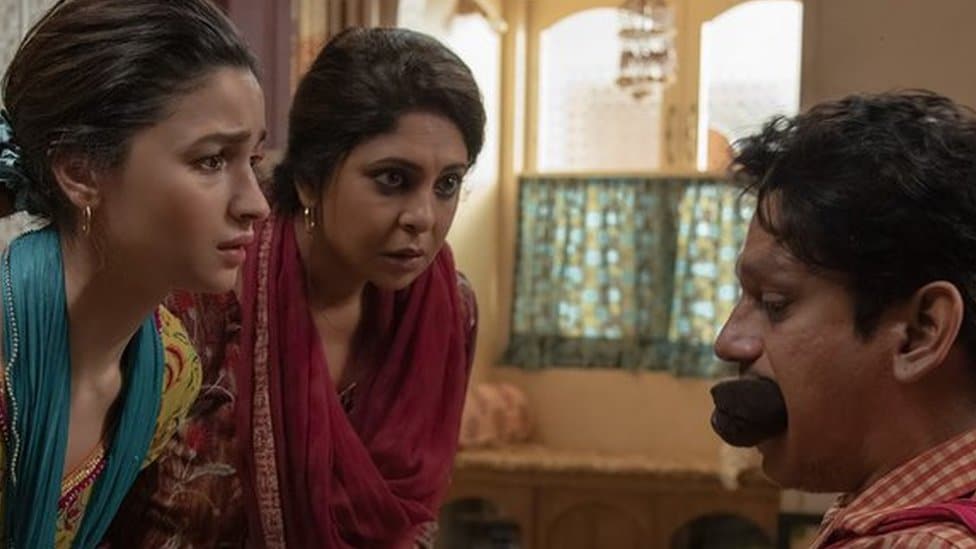Culture
As ‘Darlings’ creates awareness about domestic violence, survivors navigate trauma that still resides in their bodies
With the release of the Alia Bhatt starrer Darlings, there have been many conversations around what a domestic violence survivor looks like and behaves like. However, trauma manifests in different ways for every survivor.
Existing literature has generally focussed on the long-term mental and emotional ramifications of traumatic experiences. In recent decades, though, a paradigm shift has taken place. In his seminal work, The Body Keeps the Score, Bessen van der Kolk argues that trauma goes beyond mental scarring; it is an event that has physiological effects in the body, such as alterations in the brain’s functioning to certain stimuli. It is not just in one’s head; it has a visceral, physical basis and outlet.
The abuse cycle is eerily similar for survivors across caste, class and geographical boundaries. There is first the isolation, where the perpetrator cuts off survivors from their support systems – online, family, friends and co-workers.
For Anamika, the abuse she faced was from her partner at that time, at the age of 20. “I stayed loyal to him for around 8-9 months after the first incident of violence,” she said.
Only when Anamika’s abuser went home for Christmas, she mustered the courage to pack her bags and leave him. But it wasn’t simply an act of disappearance, for he chased her when he was back to Dubai.
Then there is demeaning and shame; invalidating the survivor, gaslighting them, crushing their self-esteem and controlling them. Then with financial isolation and sufficient rewards, the perpetrator ensures the survivor is told that they can’t do any better.
Like most survivors, initially Anamika fought with feelings of denial and self-doubt. “After not processing it for a while I went through nights of sleeplessness, extreme negative self-talk as to how I could be so naive and trusting of people who have shown their true colors,” she said.
She stayed in the arrangement for as long as she did because she hoped he would change. But most abusers, without consequences, are unlikely to make amends for the harm they’ve caused.
Namrata was emotionally, sexually and physically abused by her then partner, when she was 16-years-old. The abuse escalated shortly after her father’s death. “He used to slap me in public if he saw me talking to any guy outside my classes,” she said. She once underwent 19 tests to check her physical health after her abuse.
“I was so emotionally entangled that I gave him another chance, but after 8 months I was raped at my own place on September 8, 2011,” she said.
In a study conducted amongst 17,000 participants in the mid-90s, Fellitti listed and ranked the traumatic experiences these participants suffered during their childhood, terming them Adverse Childhood Experiences (ACEs). The higher the number of ACEs they faced, the greater the probability that they were ailing from physical encumberments like diabetes or cancer.
Namrata developed Costochondritis, an inflammation of the cartilage that connects the rib to the breastbone. She was also diagnosed with clinical depression. She also faced abuse as a child in the creche her parents had left her in. “I still have this memory as fresh as the day it happened,” she said.
She always found sex painful, and experienced flashbacks every time she indulged in sexual activity. “I still sometimes see that face if I close my eyes while having sex. I still don’t know if I’ve suppressed my emotions, or I’ve made peace with whatever happened,” she said.
The abuse resulted in several suicide attempts, affected her academics, her career and her relationships. Her beautiful relationship with her mother however, gives her the courage to keep moving forward.
For Max, a 22-year-old trans man, the abuse happened both at home and with their former partners. “When staying with parents, my entire childhood, I faced all sorts of abuse; from emotional, gaslighting, manipulating, physical abuse, to not letting me eat, sleep, and being financially deprived of access to my own bank account.”
Until 2021, Max’s only sexual experience has been coercion. They also developed a psychosomatic disorder of Irritable Bowel Syndrome that flares up when they are in distress. Max also has borderline personality disorder and chronic post-traumatic stress disorder, which they assume has surfaced because of childhood abuse and neglect.
“I disassociate, I fly, I shiver, tremble, I have trouble breathing, I get anxiety attacks almost daily. I am heavily dependent on medicines for sleep,” they said.
According to Kolk, if a person manages to escape the threatening situation, the alarm bells in the brain subside. However, if they do not manage to escape, they can be “stuck in their trauma”. They continue to relive it. They have trouble sleeping, difficulty with emotional regulation that affects their relationships, jobs, as well as executive functions like showering, drinking water and offering nutrition to their body.
Max processes their trauma by not thinking about it. They also process it by allowing themselves to be vulnerable, access therapy, community and are on medication. “Accessing healthcare is the most revolutionary thing one can do in one’s capacity. To be human in fulfilling ways is not what capitalist societies allow,” they said.
For Arushi, childhood abuse took many forms; within her immediate family and her relatives, from the age of 4-years. Society normalizing familial abuse made it much harder for her to speak up against it. “She hit me so many times, she’s locked me so many times, she’s pinned me down, hit me with a slipper, commented on my body,” she said.
The abuse was predominantly emotional and physical, crushing Arushi’s sense of self. “Now that I recollect these narratives and experiences, it seems like my family has been really abusive, but they’ve always masked it with love. Where I’ve grown up, I think how I’ve processed trauma, I don’t, sadly, know what love is. Because the people who abused me kept saying ‘We love you’,” she said.
Arushi lives with chronic post traumatic stress condition “I know that my body remembers. One of the symptoms is my weight gain. I used to be very petite and she used to be heavier than me. So, I couldn’t fight back. How my body made sense of that trauma is that it gained weight so that I could fight back,” she said.
Arushi faces delusion and paranoia when it comes to love. She shivers during intimacy, and regularly experiences flashbacks. However, becoming a therapist has helped her cope with her trauma. Her clients give her strength and resilience, and have kept her going, especially through the pandemic. “Even though the experiences they carry and bring in are different, yet the kind of holding I receive from their presence is immeasurable,” she said.
For Ashley, her former husband was a source of emotional, physical and sexual violence. She got married at the age of 18-years, and the next five years of facing domestic violence, left her emotionally fractured by the age of 22, after which she finally separated from her abusive husband.
However, by the time Ashley got out of her marriage, she got diagnosed with post traumatic stress disorder and experienced shivers, sleeplessness, flashbacks. “I really had to feel it all instead of suppressing or denying it. Then only I could let it go,” she says.
Having the privilege to access therapy, be supported by her siblings and her spiritual practices helped Ashley cope with the trauma of her abusive marriage. She now forgives her abuser. She felt like the rage did her no good. “It kept me hooked in the past.” She feels more sensitive, empathetic and not disassociated, but connected to herself and those around her. “It has helped me to see flaws and the beauty around me and navigate my boundaries really well.”
Even though the costs of abuse are life-long, the laws fail to deal with it. In India, the only law against domestic violence is the Protection of Women from Domestic Violence Act. Under the act, if found guilty, the perpetrator can be sentenced to a 3-year stint in a penitentiary, in addition to a fine. Previously, victims of domestic violence had but few legal recourse, taking the support of Section 498A of the Indian Penal Code. As per the law, women and children can file a case against an abuser they share the household with.
With the stories of these abuse victims now coming to light through writing , art and films like ‘Darlings;, it’s high time the government makes strict laws which favor the abused and take in consideration the intensity of trauma their mind and body has to go through.
Disclaimer: The views and opinions expressed in this article are those of the authors and do not necessarily reflect the official policy or position of the publication










































